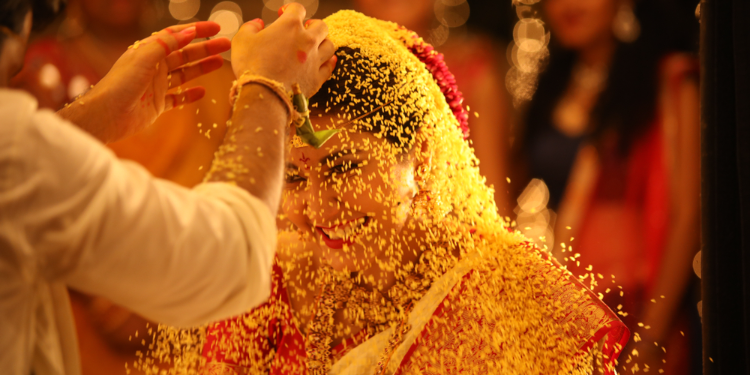
Every country has its own traditions, symbols and cultural practices. These are particularly evident on special occasions such as weddings. A unique day that calls for unique traditions that you need to be aware of to avoid offending families and making a blunder. Here's an overview of the different rites around the world, which you need to know if you're planning to get married abroad or if you've been invited to a wedding ceremony in your host country.
The dowry in traditional marriage
Indissociable from customary marriage, the dowry seals the union of two families. For a successful marriage, knowing the customs and traditions is essential. The practice is still widespread in India, Thailand, China, Papua New Guinea, Ghana, Egypt, Nigeria, Algeria and other African countries. Culturally, dowry is a celebration, along with traditional dances and meals.
The dowry is a sum of money and/or gifts paid between both families, usually payable by the groom or bride. It can be paid in one lump sum or installments (in the case of large dowries). A symbolic dowry need not be large, however. However, some parents have found it a good way of enriching themselves. This controversy has been going on for years.
A cultural and religious symbol, the dowry has become a financial burden for many. It is believed to transform women into commercial goods, reinforcing gender stereotypes. There are stories of women who remained unmarried because the dowry was too high, and men compelled to take out loans or work several jobs to pay the dowry. Many give up along the way, put off by the extravagant demands of some in-laws.
Dowry and abuses
Others speak of an archaic practice that, in some cases, encourages violence against women. Indeed, some men believe that paying a dowry gives them every right over their wives. So should dowries be banned? In many African countries, such as Ivory Coast and Burkina Faso, it is formally prohibited by law. India has also banned dowries, but the practice is still widespread. It is even on the rise in India. According to a World Bank study, 95% of brides pay dowries (June 2021). Every year, women are victims of domestic violence and/or mistreated by their in-laws because of unpaid dowries. Some women commit suicide, while others are pressured by their families. In India, the practice is said to reinforce the preference for boys and discourage families from educating girls.
Other marriage traditions and rites around the world
Far from the dowry and its possible abuses and much lighter, other traditions and cultural practices are supposed to bring joy and prosperity to the bride and groom. In some areas of Greece, the "money dance" symbolizes prosperity and wealth to the newlyweds. The principle is simple: money is hung on the bride's dress, and the joy of the dance is supposed to do the rest. There's no money dance in Germany, but rather a waltz of broken dishes. The idea is to break lots of dishes before the wedding. The tradition is intended to remind the couple of the need to face adversity together. However, it's not certain that everyone will go to the trouble of perpetuating this tradition. Ecological principles have also made their way into weddings, calling for greater sobriety.
In Morocco, no good traditional wedding is complete without the "negafa", the bride's traditional dressers. As well as dressing the bride, they are the guarantors of traditions and ceremonies, ensuring that all rites are correctly performed. In Japan, the "san, san, kudo" is the highlight of the Shinto wedding. The term literally means "three, three, nine times" and refers to the lucky numbers (3 and 9). San, san kudo is a ritual in which the bride and groom each drink 3 sips of cold sake from 3 cups.
Wedding dress and color code
What are the "right colors" for a happy marriage? Here again, there are cultures and traditions to be aware of to avoid any mistakes.
In Sweden, there are no red weddings. The rule applies to everyone, guests and bride and groom alike. In Sweden, red is associated with deception. Any guest who dares to show up at the wedding wearing red implicitly implies that they have had an affair with the groom. Conversely, in China or India, red is the color. Wedding hall decorations, invitations, accessories, and the bride's dress are deemed better in red, representing fertility, loyalty, success, honor and love. In India, women marry in red saris, the color of union and fertility.
The wedding dress is white in Western countries, such as France, Germany and Belgium. For a traditional Japanese wedding, the bride's kimono is also white - a color (or rather the absence of color) that symbolizes purity. But for a traditional Chinese wedding, it's best to avoid white, the color of mourning. The all-white look is also to be avoided for a traditional African wedding. Instead, boubous and traditional costumes in shimmering colors and patterns are preferred. In Mauritania, the tradition is to wear black. Mauritanian brides wear a "lakhel", a luxurious black veil made from embroidered fabric, while grooms wear white.
Numbers and superstitions
Is there a special day to celebrate your wedding on? Here again, customs play a significant role in the choice of date, tinged with various superstitions. When getting married in Italy, it's best to avoid Tuesdays (associated with the god of war) and Fridays (associated with the day of the creation of evil spirits). You should also avoid May, August, Lent and the pre-Christmas period.
In India, the day and time of marriage are determined by the stars. In China, prospective brides and grooms consult Chinese horoscope to find their wedding date. The Year of the Dragon is the most popular. The Japanese calendar (kyûreki, lunisolar calendar) is the best choice for a Japanese-style wedding. It's based on Chinese astrology and lists good and bad days. Time is divided into 6-day periods (rokuyô) and is repeated from the first day of each lunar month. Important decisions, such as wedding dates, are made according to the rokuyô.
The Japanese avoid getting married in October, which is the month of "no gods" (kannazuki). All the deities are supposed to gather at the Izumo shrine (in Shimane prefecture). Horoscopes are also used to assess the compatibility of future brides and grooms to ensure an auspicious marriage.
There are many more unique marriage cultures and traditions around the world. Some, such as the dowry, are controversial and regularly questioned. Some brides-to-be refuse it, while others demand it be purely symbolic (a minimal sum or a gift, again of little value). Others are much lighter, to the great delight of brides and grooms. All that's left is to find a suitable date, the proper dress code, the menu for the day, and the venue, for a unique day.



















